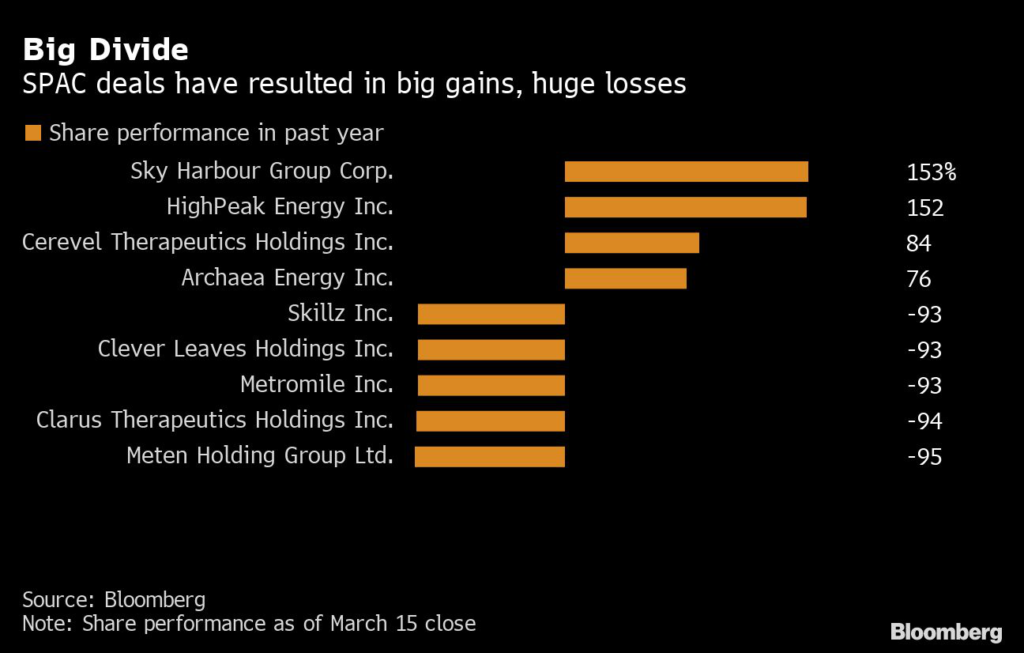(Bloomberg) — Investors grabbing shares in beaten-down companies after a merger with blank-check firms aren’t getting much of a bargain. In most cases, they’re still paying dearly for promises of revenue and profits that remain years away.
The median price-to-sales ratio for companies that merged with special-purpose acquisition companies since the start of 2020 sits at roughly 4.1, even after the sector has shed more than half of its value in the past year.
And this counts only the ones with revenue to measure. Over half of the 286 target companies didn’t have any, according to data compiled by Bloomberg.
That’s far higher than the benchmark S&P 500 Index, home of the world’s blue-chip corporations, which trades at about 2.8 times sales.
While investors routinely pay more for startups because they’re counting on exponential growth, the prospects for some of these nascent companies targeted by SPACs are so shaky that they’ve warned they might be forced out of business.
The rich valuations remind Jay Ritter at the University of Florida of initial public offerings in the 1980s and 1990s, which were typically done by young companies with similarly optimistic business models.
“A lot of them turned out to be disappointments for investors, and so far that’s been true with a set of companies that have recently merged with SPACs,” said Ritter, a finance professor who specializes in public-listings data.
Pricey multiples could support speculation that SPACs will overpay in order to guarantee their own self-preservation.
Blank-check firms raise cash through public offerings so they can find and buy an operating business, but their structure typically requires a deal to be closed within two years, or else sponsors have to return the money.
With that deadline looming, there’s a backlog of more than 600 SPACs still searching for deals.
The SPACs and the companies with which they merge have fallen sharply out of favor. The De-SPAC Index, which tracks 25 such companies, is down more than 60% in the past 12 months.
“Betting on newer, ‘hype’ companies with little realized value pose higher risks than any other type of investing,” said Anderson Lafontant, Miracle Mile Advisors senior advisor.
“With the mania of SPACs fizzling, their actual performance is coming into light.”
EV Rout
Many of the high-profile de-SPACs are in the electric vehicle space, like Lucid Group Inc. or ChargePoint Holdings Inc., while others have used celebrity ties to garner investor interest.
Lucid, which carries a $38.6 billion value, booked just $26.4 million in fourth-quarter revenue and sliced its 2022 production targets last month, blaming supply chain disruptions.
To be fair, a bevy of companies already generating millions in sales have gone public via SPAC deals, but nevertheless are coming under pressure because of their blank-check origins.
“The issue is how the market is valuing them,” Ritter said.
Metaverse-tied data platform company Matterport Inc. and Southeast Asia’s ride-hailing and delivery giant Grab Holdings Inc. are among those Ritter has kept an eye on.
Matterport has tumbled nearly 80% from a Nov. 29 record close while Grab has shed $21 billion in value from a December debut.
Companies that might not have been ready for prime time litter the worst performers among former SPAC targets.
Clarus Therapeutics Holdings Inc. has sunk so low it’s in danger of losing its listing and said in a December filing it doesn’t have enough cash to last another 12 months without more capital.
Other de-SPACs with steep declines in market value include Skillz Inc.
and Sema4 Holdings Corp., former darlings of Cathie Wood’s Ark Invest.
On the flip side, HighPeak Energy Inc. has more than doubled in the past year amid a rally for commodities while Holley Inc., a car part manufacturer, is up more than 40% since its debut in July as sales soared nearly 40% in 2021.
Finance chiefs from Matterport and Skillz said their companies were being swept up with other technology stocks that have been under pressure amid expectations that interest rates will rise along with inflation, which tends to depress the current value of future earnings.
Skillz Chief Financial Officer Ian Lee said in an interview that the range of companies that went public via SPAC merger have been “put under a negative halo.”
Representatives for the other companies mentioned didn’t immediately respond or provide a comment.
More stories like this are available on bloomberg.com
©2022 Bloomberg L.P.











